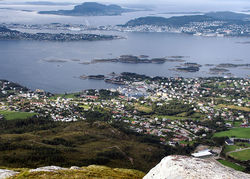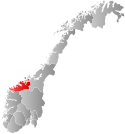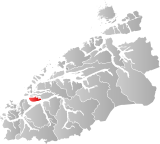Sula (Urban East Norwegian: [ˈsʉ̀ːɽɑ] ⓘ) is a municipality in Møre og Romsdal county, Norway. It is part of the Sunnmøre district. The administrative centre is the village of Langevåg. Other villages include Solevåg, Fiskarstrand, Veibust, Leirvågen, and Mauseidvåg. Sula is one of the most densely populated municipalities in Møre og Romsdal county, and it is part of the Ålesund Region since it is just south of the city of Ålesund. The municipality encompasses the island of Sula and the many small surrounding islets.[4]
Sula Municipality
Sula kommune | |
|---|---|
 View of Langevåg (looking towards the town of Ålesund, administrative center of the neighbouring municipality) | |
 Møre og Romsdal within Norway | |
 Sula within Møre og Romsdal | |
| Coordinates: 62°25′29″N 06°12′22″E / 62.42472°N 6.20611°E | |
| Country | Norway |
| County | Møre og Romsdal |
| District | Sunnmøre |
| Established | 1 Jan 1977 |
| • Preceded by | Ålesund Municipality |
| Administrative centre | Langevåg |
| Government | |
| • Mayor (2023) | Turid Humlen (H) |
| Area | |
• Total | 58.52 km2 (22.59 sq mi) |
| • Land | 57.07 km2 (22.03 sq mi) |
| • Water | 1.45 km2 (0.56 sq mi) 2.5% |
| • Rank | #346 in Norway |
| Population (2023) | |
• Total | 9,636 |
| • Rank | #117 in Norway |
| • Density | 168.8/km2 (437/sq mi) |
| • Change (10 years) | |
| Demonym | Sulalending[1] |
| Official language | |
| • Norwegian form | Nynorsk |
| Time zone | UTC+01:00 (CET) |
| • Summer (DST) | UTC+02:00 (CEST) |
| ISO 3166 code | NO-1531[3] |
| Website | Official website |
The 59-square-kilometre (23 sq mi) municipality is the 346th largest by area out of the 356 municipalities in Norway. Sula is the 117th most populous municipality in Norway with a population of 9,636. The municipality's population density is 168.8 inhabitants per square kilometre (437/sq mi) and its population has increased by 14.8% over the previous 10-year period.[5][6]
General information
editOriginally, most of the island of Sula was part of Borgund Municipality and the small southwestern part of the island was part of Ulstein Municipality (see formannskapsdistrikt law). On 1 July 1958, the southwestern part of Sula island was transferred to Borgund, unifying the whole island as part of the same municipality. In 1968, Borgund (including all of the island of Sula) was merged with the town of Ålesund to form the large municipality of Ålesund. On 1 January 1977, the entire island of Sula and the many small islets around it were separated from Ålesund to become the new municipality of Sula. The initial population of the Sula was 6,302.[7]
Name
editThe municipality is named after the island of Sula (Old Norse: Súla) since the island made up the majority of the municipality. The name is likely derived from the word súla which means "cleft", probably referring to the cleft between the twin peaks of Rundehornet and Vardane.[4][8]
Coat of arms
editThe coat of arms was granted on 16 December 1983. The official blazon is "Azure, a chief and pile argent" (Norwegian: I blått eit sølv skjoldhovut med nedvend spiss). This means the arms have are divided with a horizontal line that has a triangular part that drops below the main line. The field (background) below the line has a tincture of blue. Above the line, the field has a tincture of argent which means it is commonly colored white, but if it is made out of metal, then silver is used. The design was chosen to symbolize the cleft of the island between the twin peaks of Rundehornet and Vardane. The arms were designed by Jarle Skuseth. The municipal flag has the same design as the coat of arms.[9][10][11]
Churches
editThe Church of Norway has one parish (sokn) within Sula. It is part of the Nordre Sunnmøre prosti (deanery) in the Diocese of Møre.
| Parish (sokn) | Church name | Location of the church | Year built |
|---|---|---|---|
| Sula | Langevåg Church | Langevåg | 1948 |
| Indre Sula Church | Mauseidvåg | 1984 |
Geography
editSula includes one main island and many small surrounding islets. It is bordered by the Sulafjorden strait to the west, the Storfjorden to the south, the Hessafjorden and Borgundfjorden to the north, and the narrow Vegsundet strait to the east. The only road access to the island is the European route E39 highway bridge over the Vegsundet.
The natural environment is typically coastal with a sparse forest. The landscape is mostly rocky with heather covering the ground. The highest elevation is the 776-metre (2,546 ft) tall mountain Sulafjellet. Its neighbouring municipalities are all separated from it by sea, with Hareid to the west, Ørsta to the south, Giske to the northwest, and Ålesund to the north and east.
Government
editSula Municipality is responsible for primary education (through 10th grade), outpatient health services, senior citizen services, welfare and other social services, zoning, economic development, and municipal roads and utilities. The municipality is governed by a municipal council of directly elected representatives. The mayor is indirectly elected by a vote of the municipal council.[12] The municipality is under the jurisdiction of the Møre og Romsdal District Court and the Frostating Court of Appeal.
Municipal council
editThe municipal council (Kommunestyre) of Sula is made up of 29 representatives that are elected to four year terms. The tables below show the current and historical composition of the council by political party.
| Party name (in Nynorsk) | Number of representatives | |
|---|---|---|
| Labour Party (Arbeidarpartiet) | 6 | |
| Progress Party (Framstegspartiet) | 9 | |
| Conservative Party (Høgre) | 6 | |
| Christian Democratic Party (Kristeleg Folkeparti) | 3 | |
| Socialist Left Party (Sosialistisk Venstreparti) | 1 | |
| Liberal Party (Venstre) | 1 | |
| Sula List (Sulalista) | 3 | |
| Total number of members: | 29 | |
| Party name (in Nynorsk) | Number of representatives | |
|---|---|---|
| Labour Party (Arbeidarpartiet) | 6 | |
| Progress Party (Framstegspartiet) | 9 | |
| Conservative Party (Høgre) | 4 | |
| Christian Democratic Party (Kristeleg Folkeparti) | 3 | |
| Socialist Left Party (Sosialistisk Venstreparti) | 2 | |
| Liberal Party (Venstre) | 1 | |
| Sula List (Sulalista) | 4 | |
| Total number of members: | 29 | |
| Party name (in Nynorsk) | Number of representatives | |
|---|---|---|
| Labour Party (Arbeidarpartiet) | 6 | |
| Progress Party (Framstegspartiet) | 8 | |
| Green Party (Miljøpartiet Dei Grøne) | 1 | |
| Conservative Party (Høgre) | 5 | |
| Christian Democratic Party (Kristeleg Folkeparti) | 4 | |
| Liberal Party (Venstre) | 1 | |
| Sula List (Sulalista) | 4 | |
| Total number of members: | 29 | |
| Party name (in Nynorsk) | Number of representatives | |
|---|---|---|
| Labour Party (Arbeidarpartiet) | 5 | |
| Progress Party (Framstegspartiet) | 9 | |
| Conservative Party (Høgre) | 5 | |
| Christian Democratic Party (Kristeleg Folkeparti) | 4 | |
| Liberal Party (Venstre) | 2 | |
| Sula List (Sulalista) | 4 | |
| Total number of members: | 29 | |
| Party name (in Nynorsk) | Number of representatives | |
|---|---|---|
| Labour Party (Arbeidarpartiet) | 5 | |
| Progress Party (Framstegspartiet) | 10 | |
| Conservative Party (Høgre) | 2 | |
| Christian Democratic Party (Kristeleg Folkeparti) | 4 | |
| Centre Party (Senterpartiet) | 1 | |
| Liberal Party (Venstre) | 1 | |
| Sula List, party independent list for Sula (Sulalista, partipolitisk uavhengig liste for Sula) | 6 | |
| Total number of members: | 29 | |
| Party name (in Nynorsk) | Number of representatives | |
|---|---|---|
| Labour Party (Arbeidarpartiet) | 4 | |
| Progress Party (Framstegspartiet) | 11 | |
| Conservative Party (Høgre) | 4 | |
| Christian Democratic Party (Kristeleg Folkeparti) | 4 | |
| Centre Party (Senterpartiet) | 1 | |
| Liberal Party (Venstre) | 1 | |
| Sula List, party independent list for Sula (Sulalista, partipolitisk uavhengig liste for Sula) | 4 | |
| Total number of members: | 29 | |
| Party name (in Nynorsk) | Number of representatives | |
|---|---|---|
| Labour Party (Arbeidarpartiet) | 4 | |
| Progress Party (Framstegspartiet) | 5 | |
| Conservative Party (Høgre) | 4 | |
| Christian Democratic Party (Kristeleg Folkeparti) | 6 | |
| Liberal Party (Venstre) | 2 | |
| Sula List (Sulaliste) | 8 | |
| Total number of members: | 29 | |
| Party name (in Nynorsk) | Number of representatives | |
|---|---|---|
| Labour Party (Arbeidarpartiet) | 5 | |
| Progress Party (Framstegspartiet) | 4 | |
| Conservative Party (Høgre) | 3 | |
| Christian Democratic Party (Kristeleg Folkeparti) | 6 | |
| Centre Party (Senterpartiet) | 1 | |
| Liberal Party (Venstre) | 2 | |
| Independent list for Sula (Uavhengig liste for Sula) | 8 | |
| Total number of members: | 29 | |
| Party name (in Nynorsk) | Number of representatives | |
|---|---|---|
| Labour Party (Arbeidarpartiet) | 4 | |
| Progress Party (Framstegspartiet) | 2 | |
| Conservative Party (Høgre) | 5 | |
| Christian Democratic Party (Kristeleg Folkeparti) | 6 | |
| Liberal Party (Venstre) | 2 | |
| Independents list for Sula (Uavhengig liste for Sula) | 10 | |
| Total number of members: | 29 | |
| Party name (in Nynorsk) | Number of representatives | |
|---|---|---|
| Labour Party (Arbeidarpartiet) | 4 | |
| Progress Party (Framstegspartiet) | 4 | |
| Conservative Party (Høgre) | 5 | |
| Christian Democratic Party (Kristeleg Folkeparti) | 6 | |
| Liberal Party (Venstre) | 3 | |
| Independent list for Inner Sula (Uavhengig liste for Indre Sula) | 4 | |
| Independent list for Outer Sula (Uavhengig liste for Ytre Sula) | 3 | |
| Total number of members: | 29 | |
| Party name (in Nynorsk) | Number of representatives | |
|---|---|---|
| Labour Party (Arbeidarpartiet) | 5 | |
| Conservative Party (Høgre) | 6 | |
| Christian Democratic Party (Kristeleg Folkeparti) | 6 | |
| Liberal Party (Venstre) | 2 | |
| Non-party list for Inner Sula (Upolitisk liste for Indre Sula) | 5 | |
| Non-party list for Outer Sula (Upolitisk liste for Ytre Sula) | 5 | |
| Total number of members: | 29 | |
| Party name (in Nynorsk) | Number of representatives | |
|---|---|---|
| Labour Party (Arbeidarpartiet) | 4 | |
| Conservative Party (Høgre) | 6 | |
| Christian Democratic Party (Kristeleg Folkeparti) | 6 | |
| Liberal Party (Venstre) | 2 | |
| Non-party election list for Inner Sula (Upolitisk valliste for Indre Sula) | 5 | |
| Non-party election list for Outer Sula (Upolitisk valliste for Ytre Sula) | 6 | |
| Total number of members: | 29 | |
Mayors
editThe mayors (Nynorsk: ordførar) of Sula:
- 1977–1978: Bjarne Bjørkavåg
- 1978–1979: Per Gundersen
- 1980–1985: Hallvard Ramnefjell
- 1986–1995: Ivar H. Molvær (KrF)
- 1995–1999: Gunvor Reistad Aannø (H)
- 1999-2003: Egil Weltzien Holst (KrF)
- 2003-2011: Ronny Harald Blomvik (FrP)
- 2011-2015: Geir Ove Vegsund (H)
- 2015–2023: Jim Arve Røssevoll (Ap)
- 2023–present: Turid Humlen (H)[22]
Culture
editSula is noted for strong traditions in the field of music. Nils Petter Molvær grew up in Langevåg. Also, the community harbours a strong maritime heritage. The influence of neighbouring city of Ålesund is strong; many live in Sula while working in Ålesund, which is a short ferry ride or a longer car ride away.
Economy
editManufacturing and production is the most important economical sector. Shipyards, fish processing, textile manufacturing, and furniture production are especially vital. The most famous clothing brand from Sula is Devold of Norway, with high quality woolen sweaters and underwear.
Transportation
editTransportation in the municipality includes the European route E39 highway and several minor highways. The E39 highway enters Sula from the north (Ålesund) and it crosses the bridge at Vegsundet and continues west and then south to the Solevågen ferry quay where there are regular ferry routes to Festøya in Ørsta, across the Storfjorden. Also, there is a ferry connection in southwestern portion of Sula. This ferry has regular routes across the Sulafjorden from Sulasund to the village of Hareid on the island of Hareidlandet in the neighbouring municipality of Hareid.
Notable people
edit- Anton Ludvig Alvestad (1883 in Sula – 1956), a politician, governemtn minister, and Mayor of Ålesund in 1920–1921
- Inger Giskeødegård (born 1956 in Langevåg), a Norwegian autodidact illustrator
- Cecilie Fiskerstrand (born 1996), a footballer who plays goalkeeper for Brighton & Hove Albion W.F.C.
Musicians
edit- Stein Erik Tafjord (born 1953 in Langevåg), a jazz musician (tuba) and one of The Brazz Brothers
- Runar Tafjord (born 1957 in Langevåg), a jazz French horn player and one of The Brazz Brothers
- Nils Petter Molvær (born 1960 on Sula) a jazz trumpeter, composer, and record producer[23]
- Harald Devold (1964 in Langevåg – 2016), jazz musician (alto & soprano saxophone and flute)
- Hild Sofie Tafjord (born 1974 in Langevåg), a Norwegian jazz musician (French horn)
- Kåre Nymark (born 1974 in Langevåg), a Norwegian jazz trumpeter and composer
- Robert Post (born 1979 in Langevåg), a Norwegian singer-songwriter
- Lena Nymark (born 1980), a jazz singer and music teacher who was raised on the island Sula
References
edit- ^ "Navn på steder og personer: Innbyggjarnamn" (in Norwegian). Språkrådet.
- ^ "Forskrift om målvedtak i kommunar og fylkeskommunar" (in Norwegian). Lovdata.no.
- ^ Bolstad, Erik; Thorsnæs, Geir, eds. (26 January 2023). "Kommunenummer". Store norske leksikon (in Norwegian). Kunnskapsforlaget.
- ^ a b Thorsnæs, Geir, ed. (5 March 2018). "Sula". Store norske leksikon (in Norwegian). Kunnskapsforlaget. Retrieved 11 August 2019.
- ^ Statistisk sentralbyrå. "Table: 06913: Population 1 January and population changes during the calendar year (M)" (in Norwegian).
- ^ Statistisk sentralbyrå. "09280: Area of land and fresh water (km²) (M)" (in Norwegian).
- ^ Jukvam, Dag (1999). Historisk oversikt over endringer i kommune- og fylkesinndelingen (PDF) (in Norwegian). Statistisk sentralbyrå. ISBN 9788253746845.
- ^ Rygh, Oluf (1908). Norske gaardnavne: Romsdals amt (in Norwegian) (13 ed.). Kristiania, Norge: W. C. Fabritius & sønners bogtrikkeri. p. 61.
- ^ "Civic heraldry of Norway - Norske Kommunevåpen". Heraldry of the World. Retrieved 15 April 2023.
- ^ "Sula, Møre og Romsdal (Norway)". Flags of the World. Retrieved 15 April 2023.
- ^ "Kommunevåpenet". Sula Kommune. Retrieved 19 October 2008.
- ^ Hansen, Tore; Vabo, Signy Irene, eds. (20 September 2022). "kommunestyre". Store norske leksikon (in Norwegian). Kunnskapsforlaget. Retrieved 14 October 2022.
- ^ "Kommunestyrevalg 2023 - Møre og Romsdal". Valgdirektoratet. Retrieved 16 January 2024.
- ^ "Kommunestyrevalg 2019 – Møre og Romsdal". Valgdirektoratet. Retrieved 19 October 2019.
- ^ a b c d "Table: 04813: Members of the local councils, by party/electoral list at the Municipal Council election (M)" (in Norwegian). Statistics Norway.
- ^ "Kommunestyrevalg 2011 – Møre og Romsdal". Valgdirektoratet. Retrieved 19 October 2019.
- ^ "Kommunestyrevalget 1995" (PDF) (in Norwegian). Oslo-Kongsvinger: Statistisk sentralbyrå. 1996. Retrieved 1 May 2020.
- ^ "Kommunestyrevalget 1991" (PDF) (in Norwegian). Oslo-Kongsvinger: Statistisk sentralbyrå. 1993. Retrieved 1 May 2020.
- ^ "Kommunestyrevalget 1987" (PDF) (in Norwegian). Oslo-Kongsvinger: Statistisk sentralbyrå. 1988. Retrieved 1 May 2020.
- ^ "Kommunestyrevalget 1983" (PDF) (in Norwegian). Oslo-Kongsvinger: Statistisk sentralbyrå. 1984. Retrieved 1 May 2020.
- ^ "Kommunestyrevalget 1979" (PDF) (in Norwegian). Oslo: Statistisk sentralbyrå. 1979. Retrieved 1 May 2020.
- ^ "Turid Humlen ordførar i Sula". NRK (in Norwegian). 12 September 2023. Retrieved 19 January 2024.
- ^ Nils Petter Molvær at IMDb. Retrieved 24 March 2021.
External links
edit- Media related to Sula, Norway at Wikimedia Commons
- Møre og Romsdal travel guide from Wikivoyage
- Municipal fact sheet from Statistics Norway (in Norwegian)

